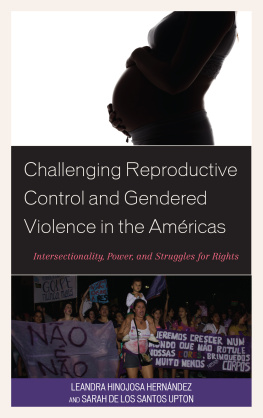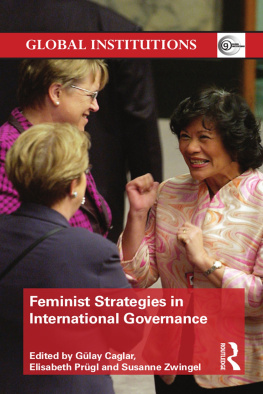Criminalising the Client
Feminist Institutionalist Perspectives
Why do institutions and international organisations continue to affect the daily lives of women and men (and different groups of women and men) differently? Why do institutions often reproduce or exacerbate patterns of disadvantage and discrimination, even when formally espousing ideals of equality? As well as seeking to expose the rules, norms and practices through which institutions produce gendered outcomes, feminist institutionalism is also concerned through detailed examples from across the globe with the potential for, and limits of, institutional innovation and reform in pursuit of gender equality and gender justice.
Published in partnership with the Feminism and Institutionalism International Network (FIIN network) this series represents the next stage of development of feminist institutionalism (FI), a novel approach to the study of politics, which combines insights from gendered analysis and institutionalist theory to expose, understand and explain the dynamics of gendered power inequalities in public and political life and their gendered effects. It aims to create a home for FI scholars as an emerging intellectual community, while encouraging dialogue between FI and wider academic communities and engaged practitioner communities.
Animated by questions that impact the lives of multiple political actors globally, the series draws together cutting-edge work from across disciplines and around the world. An important part of its agenda will be to explore the interplay between the local and the global; the domestic and the international. It will include contributions from a wide range of feminist institutionalism approaches, ranging from rational choice to discursive paradigms, as well as those that combine elements from across the variants. The series welcomes proposals for monographs and carefully curated edited collections that cover single and comparative cases from the global North and global South, as well as the international system (such as the United Nations and International Criminal Court). While the primary focus of the series is upon gendered institutional analysis, the series actively encourages submissions which take an intersectional approach.
Series Editors
Fiona Mackay, Professor of Politics, Dean and Head of the School of Social and Political Science at the University of Edinburgh.
Elin Bjarnegrd, Associate Professor and Senior Lecturer in Development Studies at Uppsala University in Sweden.
Meryl Kenny, Lecturer in Gender and Politics at the University of Edinburgh.
Titles in the Series
Criminalising the Client: Institutional Change, Gendered Ideas and Feminist Strategies , by Josefina Erikson.
Towards Gendering Institutionalism: Equality in Europe , edited by Heather MacRae and Elaine Weiner (forthcoming).
Gender and Informal Institutions , edited by Georgina Waylen (forthcoming).
Gender, Power and Institutions in Sweden , by Lenita Freidenvall (forthcoming).
Criminalising the Client
Institutional Change, Gendered Ideas and Feminist Strategies
Josefina Erikson
London New York
Published by Rowman & Littlefield International, Ltd.
Unit A, Whitacre Mews, 26-34 Stannary Street, London SE11 4AB
www.rowmaninternational.com
Rowman & Littlefield International, Ltd. is an affiliate of Rowman & Littlefield
4501 Forbes Boulevard, Suite 200, Lanham, Maryland 20706, USA
With additional offices in Boulder, New York, Toronto (Canada), and Plymouth (UK)
www.rowman.com
Copyright 2017 by Josefina Erikson
All rights reserved . No part of this book may be reproduced in any form or by any electronic or mechanical means, including information storage and retrieval systems, without written permission from the publisher, except by a reviewer who may quote passages in a review.
British Library Cataloguing-in-Publication Data
A catalogue record for this book is available from the British Library
ISBN: HB 978-1-78348-648-9
PB 978-1-7834-8649-6
Library of Congress Cataloging-in-Publication Data is Available
ISBN 978-1-78660-005-9 (cloth : alk. paper)
ISBN 978-1-78660-006-6 (paper : alk. paper)
ISBN 978-1-78660-007-3 (electronic)

The paper used in this publication meets the minimum requirements of American National Standard for Information SciencesPermanence of Paper for Printed Library Materials, ANSI/NISO Z39.48-1992.
Printed in the United States of America
Contents
This book is based on the empirical work conducted for my Ph.D. dissertation titled Struggles of Meaning. A Dynamic Frame Analysis of the Swedish Purchase of Sexual Services Act , which was defended at the Department of Government, Uppsala University, in December 2011. The research was financed by the Swedish Research Council, and grants from the Borbos Hansson foundation made it possible to finish the book manuscript. Parts of the empirical findings have previously been published in The Various Problems of Prostitution A Dynamic Frame Analysis of Swedish Prostitution Policy. In Prostitution, Harm and Gender Inequality: Theory, Research and Policy , edited by Maddy Coy.
I wish to express my gratitude to a large number of people who have helped and supported me during this project.
First of all I want to thank all my respondents; without their generous contribution the empirical analysis would not have been possible.
Within academia, I am indebted to Professor Christina Bergqvist and Professor Bo Bengtsson, who have provided great support in so many ways over the years. Also, for constructive discussions and comments at various points in time, I am very grateful to Helena Wockelberg, Karin Borevi, Viviana Stechina, PerOla berg , Marianne Danielsson, Emma Bjrnehed, Jenny Westerstrand, Pr Zetterberg, Bjrn Lindberg and Gelu Calacean. I would also like to thank Samantha Majic for her encouraging and insightful comments on early drafts of the manuscript and Lenita Freidenvall and Cecilia Josefsson for their invaluable comments on the final text. Furthermore, I want to give a special thanks to my friend and colleague Elin Bjarnegrd, who encouraged me to write this book and provided insightful and constructive comments on the final book manuscript.
I appreciate the professional assistance from Rowman and Littlefield International and wish to thank commissioning editor Dhara Snowden, the editors for the Feminist institutionalist perspectives series: Fiona Mackay, Meryl Kenny and Elin Bjarnegrd, as well as anonymous reviewers.
Parts of the empirical chapters have been translated from Swedish and I want to thank Jon Dellar for helping me with that. I am also indebted to Andrew Blasko and Fiona Mackay for fantastic help with the language.
Last but not least, I am very thankful to my family. Thank you Oscar Larsson for interesting discussions and great support; and to our wonderful children, Esmeralda, Darian and Elvira, I want to thank you for just for being there!
In 1998, Sweden became the first country in the world to criminalise the purchase of sexual services, although it remained legal to sell sex. The ban was disputed from the very beginning for its novel approach to prostitution, and it has continued to attract attention nationally as well as internationally not only in media but also among politicians and academics. Critics argue that criminalisation worsens the situation for women in prostitution, whereas advocates hail it as an example of a feminist success pointing at mens responsibility. Regardless of normative considerations, the ban is indeed an intriguing case from a feminist perspective since one stated purpose of the law was to acknowledge the gendered logic of prostitution and to change societys attitudes towards prostitution in a more gender-equal way. The law was thus aimed at reducing the demand for sexual services both directly through criminalisation and indirectly by changing social attitudes (Govt. bill 1997/98:55).

 The paper used in this publication meets the minimum requirements of American National Standard for Information SciencesPermanence of Paper for Printed Library Materials, ANSI/NISO Z39.48-1992.
The paper used in this publication meets the minimum requirements of American National Standard for Information SciencesPermanence of Paper for Printed Library Materials, ANSI/NISO Z39.48-1992.










